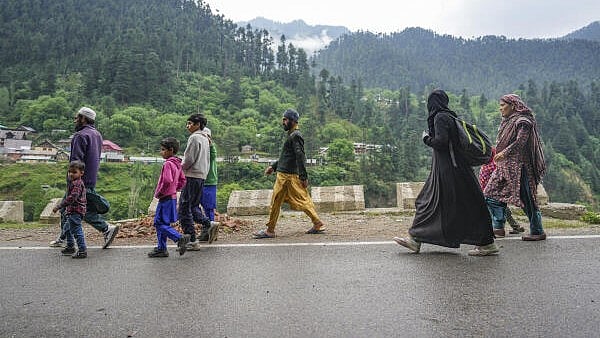
People leave with their belonging for safe places following shelling by Pakistani troops.
Credit: PTI Photo
Srinagar: Haunted by Thursday night’s blackout, drone, missile attacks and rising whispers of war, people across Jammu and Kashmir are gripped by dread, bracing for another terrifying night in darkness and the chilling silence that often comes before the storm.
On Thursday night, Indian defence forces repelled a wave of drone and missile attacks launched by Pakistan, marking a dramatic escalation in tensions between the two nuclear-armed neighbours.
Several military installations—including those in Jammu and neighbouring Pathankot—were believed to have been targeted.
While no damage was officially confirmed, loud explosions were heard in Jammu, followed by blaring sirens and a coordinated blackout across the Union Territory.
The impact was immediate and stark. Civilian life not only in Jammu but Kashmir Valley also came to a halt on Friday. The Srinagar and Jammu airports remained shut for the third consecutive day, all educational institutions were ordered closed, and public transport largely disappeared from the roads.
Even Srinagar’s commercial hub, Lal Chowk, was eerily deserted—its shops shuttered and footpaths empty.
“Everyone is talking about India and Pakistan going to war,” said 22-year-old university student Firdous Wani. “We are caught in the middle. We don’t want war. We just want to live in peace.”
In the Gojwara area of old city Srinagar, 52-year-old Bashir Khan sat huddled with his family during Thursday night’s blackout. “It felt like we were at war. The darkness, the silence, the helicopters in the sky—it reminded me of the Kargil war days. This time, it feels more dangerous.”
The closure of Srinagar airport has added to the mounting uncertainty. “I’ve been stuck in Kashmir for three days,” said Priya Mehra, a tourist from Delhi. “Even the highway is closed, and there is no way out.”
With security forces deployed in strength across major towns and surveillance intensified, residents say the atmosphere feels ominously different. “We’ve lived through curfews, lockdowns, the abrogation of Article 370, and years of conflict. But this feels different. There is silence—and in Kashmir, that kind of silence is never a good sign,” said an elderly resident of Pulwama who requested anonymity.
As power cuts continue sporadically in some areas, people are charging cell phones during brief power returns, and praying that the shadow of war passes without bloodshed.